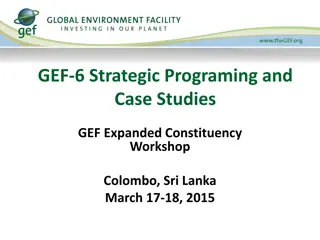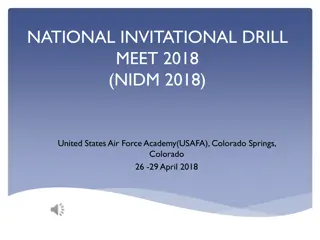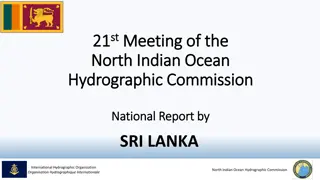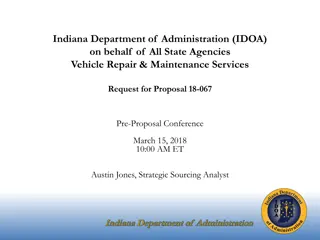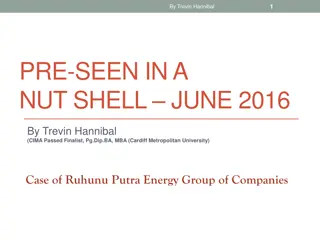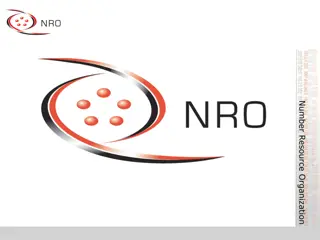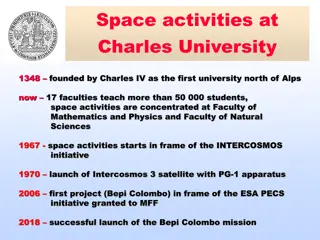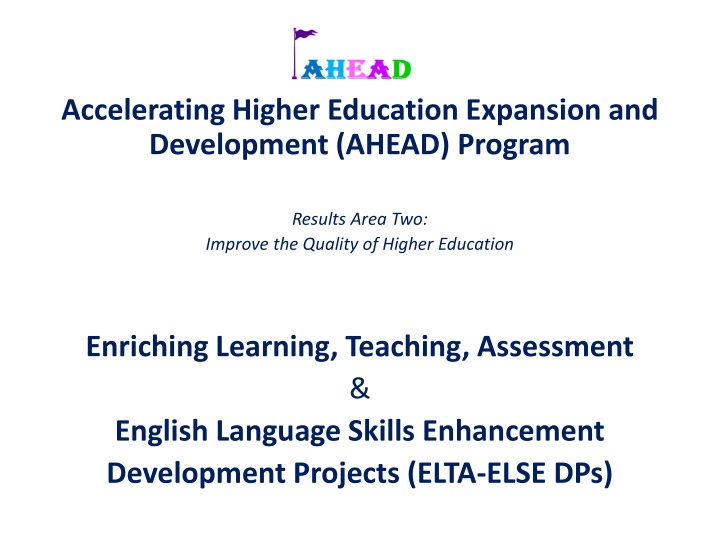
ENRICHING LEARNING: Enhancing Higher Education Quality for Job Prospects
The ENRICHING LEARNING program aims to improve the quality and relevance of higher education by promoting academic excellence, socio-emotional skills, and English language proficiency among students. By addressing the deficiencies in these areas, the program seeks to enhance the job prospects and employment performance of graduates, ultimately ensuring better participation in broader social and civic life.
Download Presentation

Please find below an Image/Link to download the presentation.
The content on the website is provided AS IS for your information and personal use only. It may not be sold, licensed, or shared on other websites without obtaining consent from the author. If you encounter any issues during the download, it is possible that the publisher has removed the file from their server.
You are allowed to download the files provided on this website for personal or commercial use, subject to the condition that they are used lawfully. All files are the property of their respective owners.
The content on the website is provided AS IS for your information and personal use only. It may not be sold, licensed, or shared on other websites without obtaining consent from the author.
E N D
Presentation Transcript
Accelerating Higher Education Expansion and Development (AHEAD) Program Results Area Two: Improve the Quality of Higher Education Enriching Learning, Teaching, Assessment & English Language Skills Enhancement Development Projects (ELTA-ELSE DPs)
RATIONALE Sri Lankan undergraduate degree programs and undergraduates exhibit a wide range of quality which can directly affect a student s wider social & civic life, future employment and economic prospects This can be especially true for students from the fields of Arts, Social Sciences, Humanities, Management and Natural Sciences Relatively high numbers of graduates from the above fields cease to participate in the labor force (mainly female graduates) show a larger time lag between graduation and finding employment when employed, high numbers are under-employed struggle to get suitable employment opt not to work in the private sector despite more opportunities /higher wages and lack of suitable opportunities in the public sector 2
Inadequate socio-emotional skills (sometimes called soft skills, EQ skills, transversality skills, transferable skills) and English language proficiency are identified as major reasons for the above As identified by employers (both private & public) inadequate socio-emotional skills and English language proficiency are true even for many of the employed
Socio-emotional skills are not expected to be taught separately but be blended into academic content to obtain better results Since programs in faculties such as Arts , Social Sciences, Management and Natural Sciences prepare students for the world of work in general, students in these programs should aim for employment in a wide range of fields Hence, it is essential that they develop socio- emotional skills together with subject knowledge 4
PROPOSED INTERVENTION Provide a competitive fund to promote academic excellence, socio-emotional skills, and English language skills proficiency among students to improve the quality and relevance of higher education with the ultimate objective of enhancing the job prospects and employment performance of graduates in order to ensure better participation and functioning in the wider social & civic life The Fund is named ENRICHING LEARNING, TEACHING, AND ASSESSMENT AND ENGLISH LANGUAGE SKILLS ENHANCEMENT DEVELOPMENT PROJECTS (ELTA- ELSE DPS) 5
The fund has two main objectives targeted by the ELTA and ELSE components: ELTA: Blending socio-emotional skills into the learning, teaching, and assessment process ELSE: English language skills development ELTA-ELSE will support a wide range of activities 6
Examples of ELTA activities: Introducing or expanding outcome-based education (OBE) and learner- centered teaching (LCT) and assessment Introducing modern and creative methods of assessment, curriculum design and delivery Introducing inter-disciplinary (inter-faculty) courses: e.g. ICT for Arts degrees; writing and language for Science degrees Providing industry placements of students (first year & final year) Introducing/enhancing LMS Facilitating industry linkages between academic staff and industry staff Introducing/enhancing career guidance programs /units Mentoring Entrepreneurship development 7
Examples of ELSE activities: English for General Purposes English for Academic Purposes English for Specific Purposes/Content and Language Integrated Learning (CLIL) Gradual transition to English medium lectures (if desired) Assessments (whole or part) to be submitted in English English language skills development for lecturers 8
English Language Skills Enhancement (ELSE) component will be facilitated Through Faculty/Department initiatives funded by the ELTA-ELSE Development Project Through UTEL
Mechanism for operationalizing UTEL Standing Committee on TESL Steering Committee for UTEL National Coordinator for UTEL University Coordinator for UTEL (from DELT/ELTU/ELTC) Faculty UTEL Coordinator
The ELTA-ELSE fund will be for the Faculties (and/or individual departments/units in Faculties) of: Arts, Humanities, Social Sciences Commerce, Management Pure & Applied Sciences It will be implemented at two levels: Faculty level Department/Unit level Funding will be provided in 2 rounds for both levels Round 1 - 2018 Round 2 - 2020
There will be 3 windows under which ELTA-ELSE funds will be awarded in rounds 1 and 2: Arts/Humanities/Social Sciences Commerce/Management Pure/ Applied Sciences Universities will be organized into 2 tiers for the competition for funds Tier 1 - older, more established universities which are not located in previously conflict affected areas Tier 2 - universities that were established after 1995 (new universities) and universities affected by the 30-year secessionist conflict. 12
Each round will have: 15 awards at faculty level distributed among the windows (Table 1) Faculties will compete against similar faculties in universities within the same tier 24 awards at department/unit level distributed among the windows (Table 2) Departments/units will compete against similar departments/units in similar faculties in all universities within the same tier 13
Table 1: ELTA-ELSE faculty funds Total Round Tier Window Commerce No of Grants Arts Pure Humanities Management & Social Sciences Applied Sciences 1 2 2 2 6 1 2 3 3 3 9 ROUND 1 TOTAL 5 5 5 15 1 2 2 2 6 2 2 3 3 3 9 ROUND 2 TOTAL 5 5 5 15 14
Table 2: ELTA-ELSE department/unit funds Total Round Tier Window No of Grants Arts Pure Commerce & Humanities Applied Sciences Management Social Sciences 1 3 3 3 9 1 2 5 5 5 15 ROUND 1 TOTAL 8 8 8 24 1 3 3 3 9 2 2 5 5 5 15 ROUND 2 TOTAL 8 8 8 24 15
FUNDING Faculty Project Each grant will be to the value of LKR 100 million ELTA component - LKR 90 million ELSE component - LKR 10 million Department /Unit Project Each grant will be to the value of LKR 15million (average) ELTA component - LKR 10.5 million (average) ELSE component - LKR 4.5 million (average)
STEPS IN IMPLEMENTATION Creating awareness in universities Advertising the Development Project and launching the website Calling for Expressions of Interest Training workshop for interested applicants Training workshop for reviewers Submission of proposals Evaluation - Evaluation will take two forms: Desk & Site Grievances Awarding of funds Monitoring & Technical support: Continuous 17










